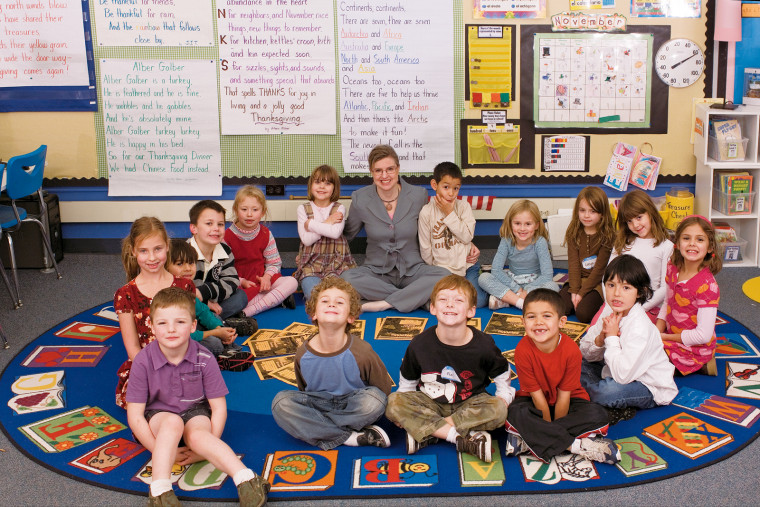Tina Decker: An Airman’s Journey
Open gallery

Fifteen squirmy first-graders tumble into the classroom—boys shoving to get in first, girls giggling with their friends.
“Okay, class, it’s time for Scholastic News,” says the teacher, her voice calm, yet authoritative. She’s dressed in a gray pantsuit, her hair pulled back into a French bun. “We’re going to learn about pumpkins today. How many of you remember how to do echo reading?”
She begins to read, “A pumpkin grows on a vine.”
“A pumpkin grows on a vine,” the children echo in unison.
She punctuates the reading with questions: “What’s something you can do with pumpkin?”
“Make pumpkin pie!” shouts a girl in Mary Janes and purple tights.
“Cook pumpkin seeds!” a blond boy jumps in, his voice rising with excitement.
The children are engaged, animated, involved. She’s got their full attention—just what you’d expect from any experienced, veteran teacher. Except that this isn’t the classroom teacher. The woman spinning the pumpkin tales is Tina Decker, a student getting her master of arts in teaching through the Graduate School of Education and Counseling. “I knew when I was 8 years old and holding classes in my basement for the neighborhood kids that I was meant to be a teacher,” says Decker, smiling broadly.
Decker is no ordinary graduate student. She’s a former Air Force officer and corporate executive, a wife, and a mom. And she’s 44 years old.
A Portland native, Decker grew up in poverty. “I was 10 years old when I realized I could break the cycle of poverty,” she says. “I was the first person in my family to go to college.”
Though she qualified for an ROTC scholarship, she did it the hard way—on her own. “I was young and principled and a little naïve financially,” she says, laughing softly. “I worked, took out student loans, borrowed from family friends.”
One year money got so tight, Decker borrowed from her local butcher. “Mr. Zenner knew I had a lot on my plate, that I was largely raising my brothers, and he wanted me to succeed. He lent me $500.”
She paid back every penny.
Decker joined the Air Force with a rank of second lieutenant and worked as a business analyst, advising generals about the most efficient ways to use resources. She planned to stay four years, but the opportunities and promotions just kept coming. The Air Force sent her to faraway places like Italy and Saudi Arabia. Her supervisors wanted to move her into a prestigious position at the Pentagon—but Decker wanted something else.
After 10 years, she left the Air Force as a captain. Her training and leadership skills quickly led to executive positions with IBM and Home Depot. She met her husband, married, and had a child. Life was good, yet she felt that nagging calling to teach.
“Teaching children is a fluid experience,” Decker says. Her own learning disabilities, including dyslexia, have taught her to use multiple teaching approaches. “Your room should be noisy; there should be a lot going on. I use as many strategies as I can to help students feel successful.”
This holistic view—teaching for the child rather than to a standardized test—is one reason Decker chose the Graduate School of Education and Counseling. “Lewis & Clark’s program is child-centered,” she says. “It’s about taking advantage of the teachable moment and incorporating math, reading, and writing into any theme. It’s about being an agent for positive change. Every teacher and principal I spoke with recommended Lewis & Clark, and that impressed me.”
Decker succeeds in teaching the children the pumpkin song. For days afterward, she hears them humming or singing in the halls.
That kind of feedback keeps her going—even after a long day of student teaching and attending classes; even as she begins her homework at 9 p.m. after tucking in her 6-year-old daughter; even when she finishes a paper at 2 a.m. or devotes entire weekends to study. For Decker, it’s all worth it.
“Am I sacrificing a lot?” she ponders. “Maybe. But I believe in giving back. The state of Oregon made sure that my brothers and I had food and heat. Now it’s my turn to give back by teaching children the skills they need to succeed. That way, I can help make the world a better place.”
More L&C Magazine Stories
Lewis & Clark Magazine is located in McAfee on the Undergraduate Campus.
MSC: 19
email magazine@lclark.edu
voice 503-768-7970
fax 503-768-7969
The L&C Magazine staff welcomes letters and emails from readers about topics covered in the magazine. Correspondence must include your name and location and may be edited.
Lewis & Clark Magazine
Lewis & Clark
615 S. Palatine Hill Road MSC 19
Portland OR 97219


